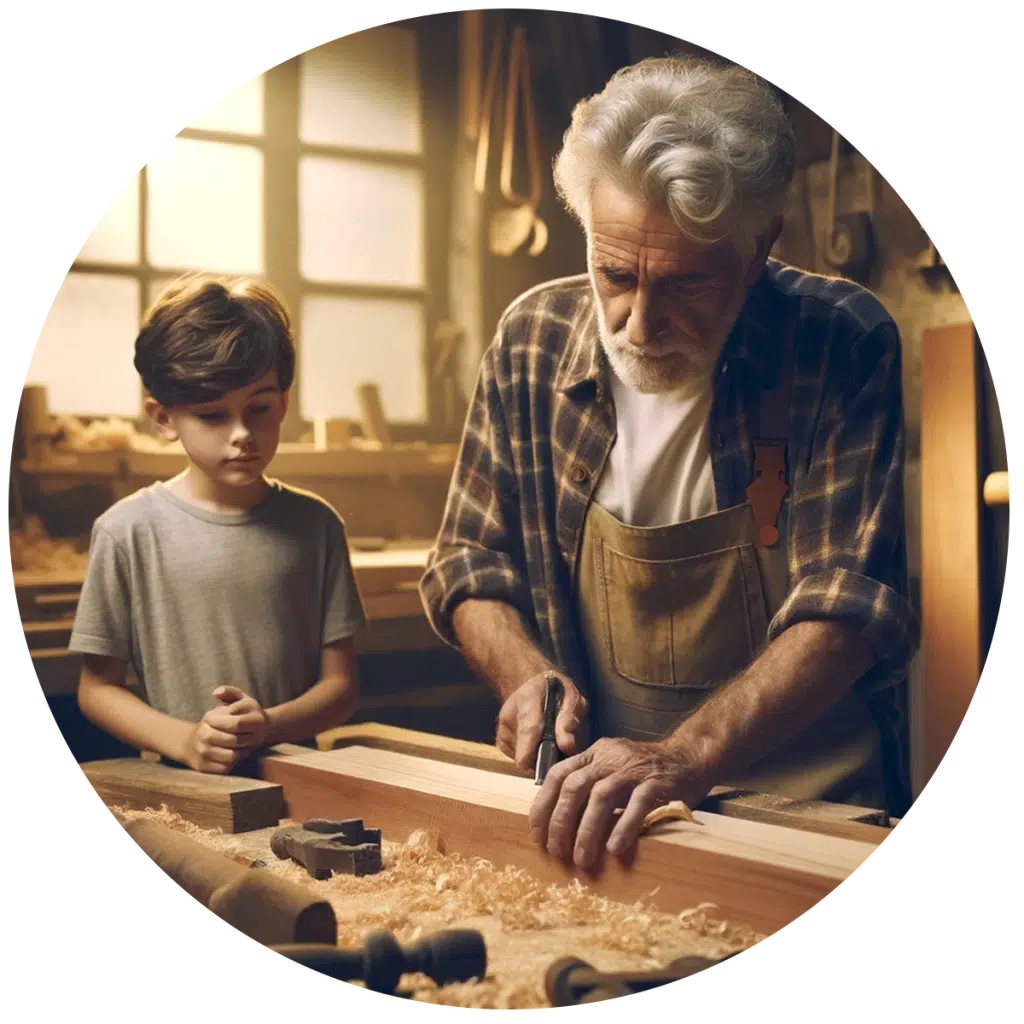There was a man named Thomas who was known by all for his quick temper. Thomas was a skilled carpenter and well respected for his craft, but people often avoided him because of his fiery outbursts, which was sparked over the smallest inconveniences.
One fine morning, a new family moved into the neighborhood. Among them was a soft-spoken boy named Samuel, who quickly became fascinated with Thomas’s woodworking. Unlike the others, Samuel was undeterred by Thomas’s reputation and would often watch him carve intricate designs from a respectful distance.
This became a daily routine and Thomas grew somewhat used to the boy’s presence, sometimes even showing him certain craftsmanship techniques.
One day, as Thomas worked on a particularly intricate piece—a beautiful cedar chest for the local church—he noticed Samuel standing nearby. His presence irritated Thomas, for he feared any distraction might spoil his work.
When Samuel innocently edged closer for a better look, he accidentally knocked over a set of chisels. The tools clattered loudly against the floor, breaking the silence and Thomas’s concentration.
Red-faced with anger, Thomas turned towards the boy with a scowl. “Can’t you see you’re in the way? Look at what you’ve done!” he bellowed, his voice thunderous enough to make Samuel’s heart sink. Filled with frustration, Thomas threw his hammer at the wood piece that caused a large piece to chip off.
Samuel’s eyes welled up with tears and he stammered an apology before running off. The neighbors peered out from their windows, shaking their heads in disapproval.
That evening, Thomas returned to his work. He had to start again from scratch with a new block of wood because the original had been damaged by his hammer. He took a good look at the damaged piece with a sudden realization – his anger had caused much more harm than the innocent mistake of Samuel that aroused his frustration.
At that moment, Thomas felt a pang of guilt but quickly buried it beneath thoughts of his own inconvenienced day.
As days turned into weeks, Samuel did not return. Thomas noticed his absence, and a surprising sense of loneliness overshadowed his pride. The neighborhood seemed quieter, less cheerful without the boy’s curious eyes and gentle demeanor.
Eventually, Thomas’s conscience could bear it no longer. He set out to find Samuel, walking the short distance to the boy’s new home where he was greeted by Samuel’s mother. Upon learning of the incident, she sighed deeply and invited Thomas in.
Samuel sat timidly in the corner of the room, still wary of the carpenter. Thomas cleared his throat, an uncomfortable feeling settling in his stomach.
“Samuel, I came to apologize,” he said, his voice softer than it had ever been. “I was too harsh. You didn’t deserve that. I wonder if you might like to learn some woodworking? You could start by helping me fix those chisels you knocked over.”
Samuel’s face lit up, and his mother nodded encouragingly. In the weeks that followed, Thomas taught Samuel the art of carpentry. The boy was a quick learner, and more importantly, he brought a sense of peace and joy to the workshop that Thomas never knew he needed.
Through Samuel, Thomas learned to curb his temper, realizing that his outbursts did not protect his craft but rather isolated him from potential friendships and the warmth of community. He understood, perhaps a little late in his life, that the damage caused by his anger was far greater than any mistake Samuel had made.

On a warm Sunday, the cedar chest was finally unveiled at the church. It was more beautiful for having been made in peace, and Thomas felt a swell of pride—not just in his work, but in his new apprentice.
As the congregation admired the chest, the priest shared a verse that resonated deeply with Thomas, “A hot-tempered person stirs up conflict, but the one who is patient calms a quarrel” (Proverbs 15:18).
Thomas knew those words were meant for him, a reminder of the storm he had calmed within himself, which was far more dangerous than any storm outside.
“Refrain from anger; abandon wrath; do not be provoked; it brings only harm. Those who do evil will be cut off, but those who wait for the Lord will inherit the earth.”
– Psalm 37:8-9
The Power of Self-Control
Thomas’s story begins with a familiar struggle we all face – anger. It is no big secret that life throws challenges our way and often tests our temperament in how we handle things. How we respond to these trials, can profoundly influence our relationships and personal growth.
The story of Thomas the angry carpenter and the young boy, Samuel, encapsulates a journey of self-reflection, redemption, and the transformative power of patience.
Let us take a quick lesson from today’s story and realize that anger is a destructive force that often leads to much more undesired outcomes than if we had acted with patience and love. Yes, it can be challenging at times to respond with love, especially when we feel like someone has wronged us. Yet we are cautioned against unrestrained anger and called to place our faith in the Lord who makes all things good.
Love Must Overcome Anger
The pivotal moment in Thomas’s journey is his decision to apologize to Samuel. This act of humility is a significant step in our Christian life, reflecting the teachings of Colossians 3:13, “Bear with each other and forgive one another if any of you has a grievance against someone. Forgive as the Lord forgave you.”
It would have been all too easy for Thomas to simply embrace his “angry carpenter” title and ignored the emotional hurt that he had caused to Samuel. Yet with a humble and heartfelt apology, Thomas unknowingly paved the way for healing and growth for both him and Samuel.
As we reflect on his journey from isolation to community integration, let us also contemplate our paths. May we seek to embrace the patience and gentleness exemplified by Samuel, and may we always be quick to forgive.
“Be kind and compassionate to one another, forgiving each other, just as in Christ God forgave you.” // Ephesians 4:32
In embracing these lessons, we not only improve our lives but also enrich those around us, building a community that reflects the love and patience of Christ. May we trust in God’s plan for us, allowing His grace to transform our hearts and actions every day.
Let us take a moment to reflect on these areas of our lives today.
In what areas of your life could you exhibit more patience?
How can you offer forgiveness, even when it is challenging?
What steps can you take to cultivate a community spirit in your daily interactions?


